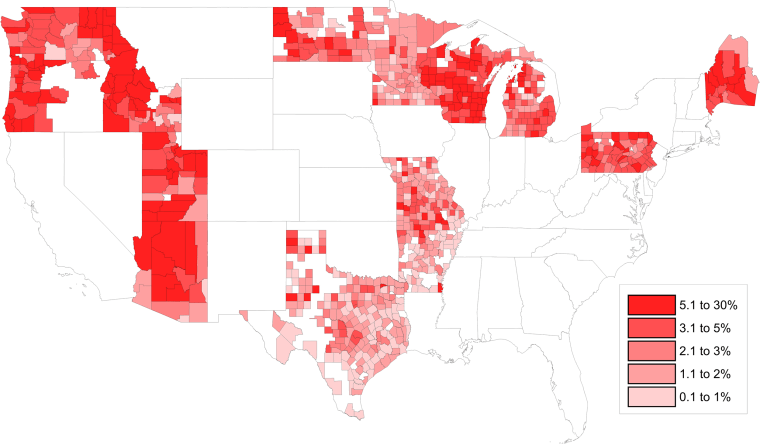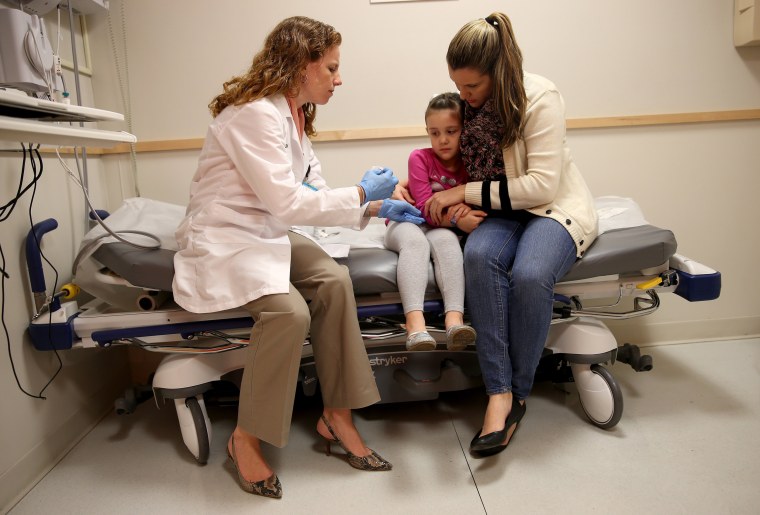Some teenagers who have never been vaccinated against diseases such as measles or chickenpox are questioning the anti-vaccine movement, even as health officials condemn parents who chose not to vaccinate their children for a measles outbreak in 10 states.
One of those teens is Mayci, an 18-year-old from Augusta, Georgia who went to Reddit for advice on vaccination after hearing about the measles outbreak.
Mayci — who asked that her last name not be included because she's worried about upsetting her mother — had never had a vaccine. The reason? Her mother's position, ‘vaccines are bad, this is something we don’t do, leave it alone,’ the teen told NBC News.
“At the time I was born, both of my parents agreed on anti-vaccination,” Mayci said. “Almost a year and a half ago, I moved out of my mother's house and in with my dad. My dad has a pretty neutral view on vaccinations, but when I was born he essentially just agreed with my mom and her family's beliefs.”
On Monday, the Centers for Disease Control and Prevention confirmed 101 cases of measles. Fifty-five of those were in Washington state, the epicenter of the outbreak. Almost all of the cases occurred in children younger than 10 whose parents had chosen not to vaccinate them.
While growing up, Mayci thought her mother’s negative views of vaccines were normal. Her mother used a religious exemption so Mayci wouldn't be required to be vaccinated in school, and told her friends to do the same.
“When I was 12, I remember all my classmates saying, 'I hated getting my shots',” Mayci said. “I asked them, ‘What do you mean, you had to get shots to get into school?’”
Georgia is one of 18 states that allows non-medical exemptions from vaccination requirements for going to school, according to the National Conference of State Legislatures. Currently, 47 states allow religious exemptions and since 2009, the number of ‘philosophical-belief’ vaccine exemptions provided to state departments has risen in 12 of the 18 states that currently allow this policy.

“What we are seeing is pockets of intense anti-vaccine activity,” said Dr. Peter Hotez, a pediatrician and dean of the National School of Tropical Medicine at the Baylor College of Medicine in Houston, Texas. “A social movement of public health vaccine opposition has been growing in the United States in recent years. Subsequently, measles outbreaks have also increased.”
Experts believe that this is one reason why anti-vaccination hot spots like Clark County, Washington have popped up. But doctors and nurses say the recent outbreak is spurring people to get vaccinated. The Washington State Health Department says about 530 people were immunized against measles in January 2018. This January, there were more than 3,000 immunizations.
Since getting vaccinated is a medical procedure, in most cases teens younger than 18 need the consent of a parent, guardian, or other adult family member.
When Mayci was 17, she talked to her dad about getting the vaccine when she turned 18.
“He honestly just said that I am old enough to make my own medical decisions. He supports my judgment,” Mayci said. “The fact that I work in a doctor's office has allowed me to really become educated on the myths and truths about vaccines.”
In 2000, measles was declared eliminated in the United States, thanks to the measles, mumps and rubella vaccine that has been part of routine childhood shots for decades. Measles is a highly contagious disease, but people who get the proper doses of the vaccine rarely contract it, even if they are exposed.
Two doses of the vaccine — at 1 year to 15 months old and a second dose at 4 to 6 years — provides about 97 percent protection. The vaccine is not perfect, in some rare cases measles will still develop despite receiving both doses, albeit a milder form of the disease. Experts are not sure why.
The recent measles outbreak is a reminder that herd immunity — which occurs when enough people are vaccinated against an infectious disease to protect others in the community who are not — has broken down in some communities.
So far, Mayci has received the TDAP (tetanus, diptheria and pertussis) vaccine and a flu shot. She plans to get the MMR vaccine, along with shots against HPV, Hepatitis A, Hepatitis B, and varicella (chickenpox) later this year.
“I graduate from high school this May and plan on majoring in clinical laboratory science in college,” she said. “Because it's a health science field, I absolutely have to have the required vaccinations.”
FOLLOW NBC HEALTH ON TWITTER & FACEBOOK




